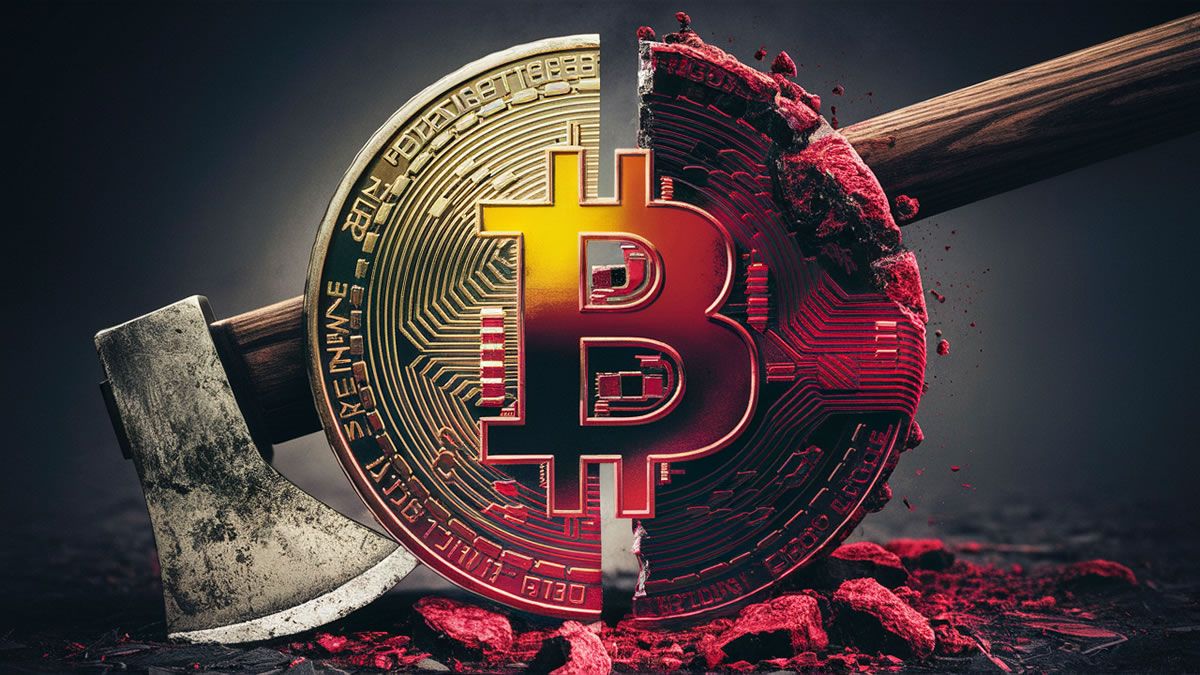How far does the FTX contagion go?
JUAN MENDE
Just as 2021 will be recognized as the year institutional money began to enter the crypto world, 2022 will surely be infamous for the seemingly endless list of problems and bankruptcies in the crypto world.
When it came out that Sam Bankman-Fried, the founder of FTX, had taken $10 billion off of FTX’s balance sheet to fix a problem at his sister quantitative trading firm, Alameda Research, the cryptomarkets became very unstable.
Until recently, lenders and hedge funds across the cryptocurrency sector viewed Alameda as a solid counterparty.
Alameda Research, Bankman-quantitative Fried’s firm, is thought to have had a lot of exposure to Three Arrows Capital and Celsius.
Alameda was a well-known company, causing many companies to do business with it. The failure of these related deals blew up much of Alameda’s balance sheet and led to the resignation of one of its CEOs at the time.
But it is now clear that Bankman-Fried used money from the FTX exchange to help Alameda’s balance sheet.
Because cryptocurrencies don’t have enough assets in reserve to stop a “run,” and because client money is being used for trading to make money, the cryptomarkets are right now very uncertain.
Who else is exposed to contagion from the FTX bankruptcy?
Here is a list of companies that could be “infected” by FTX’s insolvency.
Crypto.com
Along with many other companies, Crypto.com made its digital asset addresses public. This showed how many and what kinds of digital assets it kept for its customers.
But a suspicious transfer of 320 000 ETH (USD 400 million) to an address linked to another exchange called Gate.io in October caught the attention of many people. The transfer was sent back to Crypto.com, but CEO Kris Marszalek said the transaction was a mistake.
“It was supposed to go to a new cold storage address, but it went to an external exchange address that was whitelisted instead,” he said.
The Cronos token, which is the basis of Crypto.com’s business, has dropped 25% in the last 24 hours. On Monday, 98% of all transactions on the Cronos blockchain were withdrawals.
Monday was the first day that investors started taking money out of Crypto.com in Singapore. They were worried about how the exchange handled a USD $400 million transfer, which was a sign of FTX’s dramatic collapse.
Analysts found that Crypto.com has about $3 billion in stable coins in its wallets during its “reserves test.” A stable coin is a digital asset that is supposed to be tied to something else, like the U.S. dollar.
But on Monday, those analysts said that Crypto.com had sent more than $1 billion ($1.5 billion) in stable coins to FTX over the past year.
The explanation from Crypto.com
FTX was more than just an exchange where people could trade digital assets. It also provided “bridging” services. A crypto bridge connects two blockchains that are not the same.
Mr. Marszalek of Crypto.com said that the funds were used to protect orders and that the company’s total exposure to FTX was less than USD 10 million.
Solana Foundation
Alameda Research and FTX Trading purchased about 11.0% of Solana’s total supply (58.08M SOL tokens) from the Solana Foundation and Solana Labs.
The Solana Foundation had $1 million in FTX at the time the exchange halted withdrawals. They indicated that this is a modest fraction of the foundation’s holdings.
The foundation has deposited 3.24 million shares of FTX Trading Ltd. stock, 3.43 million FTT tokens, and 135 million SRM tokens.
BlockFi
BlockFi acknowledged “significant exposure to FTX” and its linked firms through Alameda Research’s debts, FTX.com’s assets, and FTX.US’s credit line.
BlockFi will seek a cash recovery via the defunct exchange’s insolvency. The corporation is talking with financial specialists and legal counsel while investigating various courses of action. It says it can afford to do so.
How much is owed to BlockFi is unclear. The firm denies that FTX has most of its assets. BlockFi briefly blocked withdrawals and deposits after FTX collapsed on November 11. The company is “stopping several platform activities”
Visa
Visa is no longer working with FTX. Visa said that FTX’s failure was “unfortunate” and that it is “closely watching events.” Visa said that it would keep working on digital currencies with a focus on security and trust. It works with at least 65 other crypto firms.
FTX’s Visa-powered payment cards were first made available in January. It said that these cards would be available in 40 more countries starting in October. Then, last week, it was reported that the company was going out of business.
Binance
At a Twitter spaces event on Monday, Changpeng Zhao said that Binance had previously had $580 million worth of FTT, but “we only sold only a little percentage, we still have a huge bag” of it. Zhao said this in reference to the fact that Binance still has a “large bag” of it.
Celsius Network
On November 11, the bankrupt cryptocurrency lender Celsius Network tweeted that it owned 3.5 million Serum tokens (SRM) on FTX along with around $13 million in loans to Alameda Research, a trading company with links to FTX.
According to Celsius, the loans had insufficient security, the majority of which consisted of FTT tokens.
In the interest of transparency, Celsius has approximately 3.5mm SRM tokens on FTX, most of which are locked, as well as loans to Alameda totaling approximately $13MM (based on current values) which are currently under-collateralized (primarily by FTT tokens).
— Celsius (@CelsiusNetwork) November 11, 2022
Coinbase
On November 8th, Coinbase Global Inc (COIN.O) announced in a blog post that it has received FTX deposits totaling $15 million. The company claimed that it had no financial ties to FTT, had never provided financing to Alameda Research, and had never extended credit to FTX.
Coinshares
In a statement released on November 10th, crypto asset management CoinShares revealed that it has exposure to crypto exchange FTX totaling $30.3 million.
CoinShares CEO Jean-Marie Mognetti said that the company is in “excellent” financial shape, with a net asset value of 240.6 million pounds ($282.51 million) at the conclusion of the third quarter.
Genesis
On November 9, the company tweeted, “Genesis has no substantial exposure to FTT or any other tokens created by controlled exchanges.”
It bears repeating that neither FTT nor any other token created by a controlled exchange poses a serious risk to Genesis. Our loan book is secured by USD/stables, BTC, and ETH at a 95% ratio. Furthermore, there is no history of lending between Genesis and FTX.
Kraken
On November 10th, Kraken, a cryptocurrency exchange, said that it had 9,000 FTT tokens on the FTX market and that it had not been “materially harmed” by the crash.
Silvergate Capital Corp
On Friday, Silvergate Capital Corporation said that FTX accounted for fewer than 10% of total digital asset clients’ deposits of $11.9 billion as of September 30.
The digital asset finance provider further clarified that FTX is not a custodian for Silvergate’s bitcoin-collateralized Silvergate Exchange Network (SEN) leverage loans and that Silvergate does not have any loans or investments with FTX that are currently ongoing.
Galaxy Digital
The day after FTX stopped withdrawals, Galaxy Digital Holdings Ltd. disclosed in its third-quarter results report on November 9 that it had $76.8 million in exposure to FTX, of which $47.5 million was “in the withdrawal process.”
Galois Capital
The Financial Times stated that Galois Capital’s co-founder Kevin Zhou recently informed investors in a letter that about $100 million of the hedge fund’s assets were stuck on FTX. Zhou estimated the amount to be around $50 million.
Sino Global Capital
In a statement released this morning, Sino Global Capital, a venture capital firm focusing on emerging markets, said that it had “mid-seven figures” in custody at FTX.
Ikigai
Travis Kling, the chief investment officer of Ikigai Asset Management, said that the bulk of the hedge fund’s assets were locked on FTX, but that it will continue to function as best it could. Galois Capital said that almost fifty percent of its assets were stranded.
Liquid Global
The exchange was bought by FTX this year. Liquid Global said today that it would cease fiat and cryptocurrency withdrawals “in line with the rules of voluntary Chapter 11 proceedings in the United States.”
Nestcoin
The company cited the disruption as the reason for layoffs.
SkyBridge Capital
SkyBridge Capital is attempting to repurchase the 30% share that FTX purchased a few months ago.
LayerZero Labs
The blockchain connectivity firm repurchased its ownership in the business for more than $40 million.
These companies deny exposure
The CEO of Coinbase, Brian Armstrong, said on Twitter that the platform has no significant exposure to FTX, FTT, or Alameda.
Cameron Winklevoss, co-founder of Gemini, stated that the platform has no significant exposure to FTX, FTT, or Alameda.
Robinhood informed that the service had no direct exposure to Alameda, FTX, or any of their affiliated firms. FTT is not tradable on the marketplace. Bankman-Fried of FTX owns 7.6% of Robinhood.
According to EToro the platform is not exposed to FTX or FTT. On EToro, users may trade FTT, although this is not available to U.S. consumers.
Kraken informed that the platform has no exposure to FTX or Alameda and does not facilitate FTT trading.
Cover: Covid infected Bitcoin – Universal Public Domain.
© 2024 Cryptopress. For informational purposes only, not offered as advice of any kind.
Latest Content
- Bitcoin Halving: A Turning Point Amidst Crypto Market Turmoil?
- Bitcoin’s 2024 Halving: Price Expectation
- XEROF expands its financial offerings, launches web3 finance services bundle
- Crypto Market Update – Analyzing Bitcoin, Ethereum, and Market Trends in April 2024
- Hong Kong Approves Bitcoin and Ether ETFs
Related
- The FTX loss erodes faith in the crypto community Since Tuesday, cryptocurrencies and the exchange's internal token, FTT, have gone down because FTX's financial problems....
- All the crypto companies that went bankrupt in 2022 [so far] We had to make a list to follow along with the thread. Full list inside. ...
- Crypto Events Archive A growing list of past crypto and blockchain events from around the world. Conferences, workshops, meetups, hackathons, conferences....
- Celsius, 3AC, crypto stumbles continue Financial stress and settlements continue in the cryptocurrency world....






